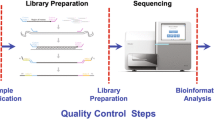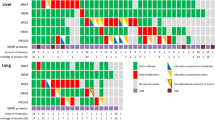Abstract
Background
Overall survival of metastatic colorectal cancer (mCRC) patients has been improved with the addition of targeted therapy such as anti-epithelial growth factor receptor monoclonal antibodies (anti-EGFR mAbs) to standard chemotherapy. Retrospective studies and randomized trials showed that the presence of RAS mutations was linked to the absence of clinical response to anti-EGFR mAbs. Patients harboring KRAS and NRAS mutations on exons 2, 3 or 4 have little or no benefit from anti-EGFR therapies. Polymerase chain reaction (PCR)-based assays are routinely used to assess KRAS and NRAS status, whereas deep sequencing with next generation sequencing (NGS) currently represents an alternative method.
Objective
The objective of our study was to identify KRAS and NRAS non-hotspot mutations using NGS of mCRC tumor samples.
Method
DNA was extracted from 188 consecutive formalin-fixed paraffin embedded samples of histologically proven colorectal cancer tumor tissue from patients with mCRC. Following amplification, DNA was sequenced by ultra-deep pyrosequencing. Non-hotspot mutations identified by NGS (frequency of mutated allele range [1.8–70.6 %]) were confirmed by Sanger direct-sequencing when possible.
Results
NGS procedure was applicable in 94 % of the cases and detected mutations in 62 % of the samples. Nine uncommon mutational profiles were found with a frequency of mutated allele > 1 %. Silent mutations were found in 3.6 % of the samples. Mutations at or near functional domains of RAS proteins, other than defined hotspots, were found in 3.6 %. NGS proved to be accurate, sensitive and suitable for routine RAS genotyping.
Conclusion
Clinical responses to anti-EGFR mAbs are potentially impaired in the presence of these uncommon RAS mutations.

Similar content being viewed by others
References
Torre LA, Bray F, Siegel RL, Ferlay J, Lortet-Tieulent J, Jemal A (2015) Global cancer statistics, 2012. CA Cancer J Clin 65(2):87–108
Brenner H, Kloor M, Pox CP (2014) Colorectal cancer. Lancet 383(9927):1490–1502
Leufkens AM, van den Bosch MA, van Leeuwen MS, Siersema PD (2011) Diagnostic accuracy of computed tomography for colon cancer staging: a systematic review. Scand J Gastroenterol 46(7-8):887–894
SEER Cancer Statistics Review, 1975-2012, National Cancer Institute. Bethesda, MD, http://seer.cancer.gov/csr/1975_2012/, based on November 2014 SEER data submission, posted to the SEER web site, April 2015. [database on the Internet]2015. Accessed
Schubbert S, Shannon K, Bollag G (2007) Hyperactive Ras in developmental disorders and cancer. Nat Rev Cancer 7(4):295–308
Boriack-Sjodin PA, Margarit SM, Bar-Sagi D, Kuriyan J (1998) The structural basis of the activation of Ras by Sos. Nature 394(6691):337–343
Bos JL, Rehmann H, Wittinghofer A (2007) GEFs and GAPs: critical elements in the control of small G proteins. Cell 129(5):865–877
Vetter IR, Wittinghofer A (2001) The guanine nucleotide-binding switch in three dimensions. Science 294(5545):1299–1304
Wittinghofer A, Waldmann H (2000) Ras—a molecular switch involved in tumor formation. Angew Chem Int Ed 39(23):4192–4214
Scheffzek K, Ahmadian MR, Kabsch W, Wiesmuller L, Lautwein A, Schmitz F et al (1997) The Ras-RasGAP complex: structural basis for GTPase activation and its loss in oncogenic Ras mutants. Science 277(5324):333–338
Wennerberg K, Rossman KL, Der CJ (2005) The Ras superfamily at a glance. J Cell Sci 118(Pt 5):843–846
Trahey M, McCormick F (1987) A cytoplasmic protein stimulates normal N-ras p21 GTPase, but does not affect oncogenic mutants. Science 238(4826):542–545
Amado RG, Wolf M, Peeters M, Van Cutsem E, Siena S, Freeman DJ et al (2008) Wild-type KRAS is required for panitumumab efficacy in patients with metastatic colorectal cancer. J Clin Oncol 26(10):1626–1634
Lievre A, Bachet JB, Le Corre D, Boige V, Landi B, Emile JF et al (2006) KRAS mutation status is predictive of response to cetuximab therapy in colorectal cancer. Cancer Res 66(8):3992–3995
Douillard JY, Oliner KS, Siena S, Tabernero J, Burkes R, Barugel M et al (2013) Panitumumab-FOLFOX4 treatment and RAS mutations in colorectal cancer. N Engl J Med 369(11):1023–1034
Linardou H, Dahabreh IJ, Kanaloupiti D, Siannis F, Bafaloukos D, Kosmidis P et al (2008) Assessment of somatic k-RAS mutations as a mechanism associated with resistance to EGFR-targeted agents: a systematic review and meta-analysis of studies in advanced non-small-cell lung cancer and metastatic colorectal cancer. Lancet Oncol 9(10):962–972
Baldus SE, Schaefer KL, Engers R, Hartleb D, Stoecklein NH, Gabbert HE (2010) Prevalence and heterogeneity of KRAS, BRAF, and PIK3CA mutations in primary colorectal adenocarcinomas and their corresponding metastases. Clin Cancer Res 16(3):790–799
Diaz LA Jr, Williams RT, Wu J, Kinde I, Hecht JR, Berlin J et al (2012) The molecular evolution of acquired resistance to targeted EGFR blockade in colorectal cancers. Nature 486(7404):537–540
Misale S, Yaeger R, Hobor S, Scala E, Janakiraman M, Liska D et al (2012) Emergence of KRAS mutations and acquired resistance to anti-EGFR therapy in colorectal cancer. Nature 486(7404):532–536
Laurent-Puig P, Pekin D, Normand C, Kotsopoulos SK, Nizard P, Perez-Toralla K et al (2015) Clinical relevance of KRAS-mutated subclones detected with picodroplet digital PCR in advanced colorectal cancer treated with anti-EGFR therapy. Clin Cancer Res 21(5):1087–1097
Li H, Durbin R (2010) Fast and accurate long-read alignment with Burrows-Wheeler transform. Bioinformatics (Oxford, England) 26(5):589–595. doi:10.1093/bioinformatics/btp698
Li H, Handsaker B, Wysoker A, Fennell T, Ruan J, Homer N et al (2009) The Sequence Alignment/Map format and SAMtools. Bioinformatics (Oxford, England) 25(16):2078–2079. doi:10.1093/bioinformatics/btp352
Koboldt DC, Zhang Q, Larson DE, Shen D, McLellan MD, Lin L et al (2012) VarScan 2: somatic mutation and copy number alteration discovery in cancer by exome sequencing. Genome Res 22(3):568–576. doi:10.1101/gr.129684.111
Koradi R, Billeter M, Wuthrich K (1996) MOLMOL: a program for display and analysis of macromolecular structures. J Mol Graph 14(1):51–55, 29-32
Der CJ, Finkel T, Cooper GM (1986) Biological and biochemical properties of human rasH genes mutated at codon 61. Cell 44(1):167–176
Schubbert S, Zenker M, Rowe SL, Boll S, Klein C, Bollag G et al (2006) Germline KRAS mutations cause Noonan syndrome. Nat Genet 38(3):331–336
Schubbert S, Bollag G, Lyubynska N, Nguyen H, Kratz CP, Zenker M et al (2007) Biochemical and functional characterization of germ line KRAS mutations. Mol Cell Biol 27(22):7765–7770
The Cancer Genome Atlas Network (2012) Comprehensive molecular characterization of human colon and rectal cancer. Nature 487(7407):330–337
Burrell RA, McGranahan N, Bartek J, Swanton C (2013) The causes and consequences of genetic heterogeneity in cancer evolution. Nature 501(7467):338–345
Sigal IS, Gibbs JB, D’Alonzo JS, Scolnick EM (1986) Identification of effector residues and a neutralizing epitope of Ha-ras-encoded p21. Proc Natl Acad Sci U S A 83(13):4725–4729
Proud CG (1986) Guanine nucleotides, protein phosphorylation and the control of translation. Trends Biochem Sci 11(2):73–77
Supek F, Minana B, Valcarcel J, Gabaldon T, Lehner B (2014) Synonymous mutations frequently act as driver mutations in human cancers. Cell 156(6):1324–1335. doi:10.1016/j.cell.2014.01.051
Author information
Authors and Affiliations
Corresponding author
Ethics declarations
No funding has been received for the conduct of this study or preparation of this manuscript.
Conflict of interest
A Harlé, P Filhine-Tresarrieu, M Husson, R Boidot, M Rouyer, C Dubois, A Leroux and JL Merlin declare no conflict of interest.
Additional information
Alexandre Harlé and Pierre Filhine-Tresarrieu contributed equally to this work.

Electronic supplementary material
Below is the link to the electronic supplementary material.
Supplementary Figure 1
Sanger sequence electropherograms of samples bearing non-hotspot mutations of KRAS or NRAS (PPTX 135 kb)
Rights and permissions
About this article
Cite this article
Harlé, A., Filhine-Tresarrieu, P., Husson, M. et al. Rare RAS Mutations in Metastatic Colorectal Cancer Detected During Routine RAS Genotyping Using Next Generation Sequencing. Targ Oncol 11, 363–370 (2016). https://doi.org/10.1007/s11523-015-0404-7
Published:
Issue Date:
DOI: https://doi.org/10.1007/s11523-015-0404-7




